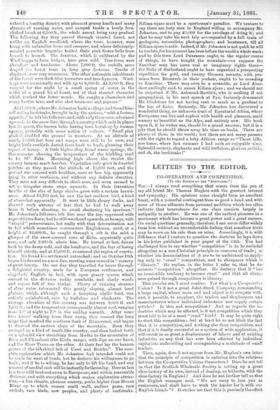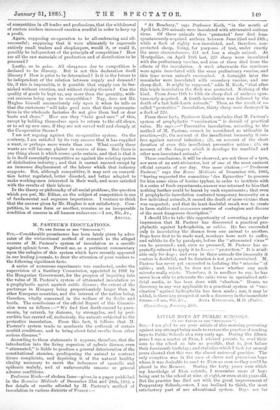LETTERS TO THE EDITOR.
CO-OPERATION AND COMPETITION.
[To THE EDITOR OF THE " SPECTATOR."1 SIII,-I always read everything that comes from the pen of my old friend Mr. Thomas Hughes with the greatest interest and sympathy. His opinions come straight from an excellent heart, with a powerfal contingent from as good a head, and with none of those affluents from personal ambition which too often indicate that benevolence for one class consists largely in antipathy to another. He was one of the earliest pioneers in a movement which has become a great power and a great success. On social questions generally, therefore, I can never differ widely from him without an uncomfortable feeling that somehow truth may be more on his side than on mine. Accordingly, it is with diffidence that IWenture to question the doctrine he lays down in his letter published in your papar of the 24th. You had challenged him to say whether "competition" is to be excluded altogether as a non-Christian principle in concerns of trade ; or whether his denunciations of it are to be understood as applying only to " cruel " competition, and to cheapness which is "illusory." He replies, in the letter I refer to, that he denounces " competition " altogether. He declares that it "has an irresistible tendency to become cruel," and that all cheapness gained through competition is illusory.
This puzzles me, I must confess. For what is a Co-operative Union ? Is it not a great Joint-Stock Company, commanding a large capital, whose main end and object is to compete with, and, if possible, to supplant, the traders and shopkeepers and manufacturers whose individual industries now supply certain articles ? Is this not competition ? And as regards the industries which may be affected, is it not competition which they must feel to be of a most "cruel" kind ? It may be quite right to start this competition ; but at least let us not blink the fact that it is competition, and nothing else than competition, and that if it is finally successful as a system of wide application, it will result in as great a displacement of labour and of existing industries as any that has ever been effected by individual capitalists underselling and extinguishing a multitude of small traders.
Then, again, does it not appear from Mr. Hughes's own letter that the principle of competition is entering into the relations between the Co-operative Unions themselves ? Does he not tell us that the Scottish Wholesale Society is setting up a great shoe-factory of its own, instead of dealing, as hitherto, with the shoe-factory in England ? And does he not further tell us that the English manager said, " We are sorry to lose you as customers, and shall have to work the harder for it with our English friends" ? It strikes me that this is precisely the effect of competition in all trades and professions, that the withdrawal of custom renders increased exertion needful in order to keep up a profit.
Again, supposing co-operation to be all-embracing and allsuccessful; supposing that it were ultimately to supersede entirely small traders and shopkeepers, would it, or could it, possibly be independent of the principle of competition ? How are all the raw materials of production and of distribution to be procured ?
Lastly, as to price. All cheapness due to competition is declared to be illusory. But is not this declaration itself illusory ? How is price to be determined ? Is it in the future to be independent of the relation between supply and demand ? Or, if this is impossible, is it possible that supply can be tarnished without exertion, and without rivalry therein ? Can the quality of goods be kept up, any more than the quantity, without recourse being open to competition ? Nay, does not Mr. Hughes himself unconsciously rely upon it when he tells us that the customers "will take good care that their representatives in the wholesale factories do not give them bad or dear boots and shoes." How can they "take good care" of this, except by holding themselves open to return to the old shops, or to set up new ones, if they are not served well and cheaply at the Co-operative Stores ?
I am not arguing against the co-operative system. On the -contrary, I am satisfied by its very success that it has supplied a want, or perhaps more wants than one. What exactly these wants are will become plainer in course of time. But there is one thing about it which seems quite certain, and that is that it is in itself essentially competitive as against the existing system of distributive industry ; and that it cannot succeed except by an immense displacement of the labour which that industry supports. But, although competitive, it may rest on competition better regulated, better directed, and better adapted to make working-men interested in their work, and more satisfied with the results of their labour.
In the theory or philosophy of all social problems, the question which you put, Mr. Editor, on the subject of competition is one of fundamental and supreme importance. I venture to think that the answer given by Mr. Hughes is not satisfactory. Competition, in some form or another, remains as au inseparable -condition of success in all human endeavour.—I am, Sir, &c,
ARGYLL.



































 Previous page
Previous page